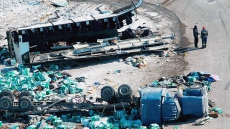Against the backdrop of the nationwide furore over the recent rape incidents, the Bombay High Court on Thursday observed sharply that India's image has "taken a beating" with an increased perception abroad that it is a "country of crimes and rapes".
A division bench of Justice S.C. Dharmadhikari and Justice Bharati Dangre said besides an impression that "liberal and secular people are not safe", due to the prevailing scenario, the rest of world is hesitant to engage with India on educational or cultural matters.
"Anywhere we go, we have to answer a barrage of questions... Unfortunate that today, the image is such that those living abroad feel only rapes and crimes take place in India.
"They are under the impression that liberal, open-minded and secular people can't be safe here and are bound to be attacked. The country's image is suffering due to acts of a few," the bench observed.
It said that no international body is keen to be part of "our educational-cultural projects, and even investors show initial enthusiasm but pull out later".

"No institution, including the judiciary in the country, is spared from this... We are very sorry to see this... Do we want to live in a cocoon?" the bench asked.
The court's candid observations came while hearing the petitions filed by the kin of slain rationalists -- Narendra Dabholkar on August 20, 2013 in Pune and Communist stalwart Govind Pansare on February 20, 2015 in Kolhapur -- seeking a court-monitored investigation.
Representing the CBI, Additional Solicitor General Anil Singh and Maharashtra CID's senior counsel Ashok Mundargi informed the court that there appears little hope now of achieving any substantial breakthrough from further field investigations.
"Now the only hope is scientific probe and evidence from the forensic evidences call detail records," Mundargi said.

To this, the court asked how could the case be taken to its logical conclusion and whether it should be permitted to reach a dead-end when such crimes are on the rise.
The judges asked why the investigating agencies could not initiate measures to "completely strangulate" the organisational backing enjoyed by the accused instead of merely waiting for them to surrender some day.
Though not critical of the investigations, the court warned that if the two agencies failed to report any progress at the next date of hearing, it would be compelled to summon senior officials.





